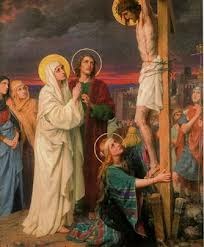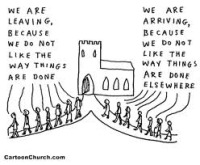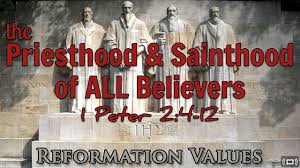 The Only Way To Be Released Is To Release
The Only Way To Be Released Is To Release
One of the hardest things about parenting is releasing! What! They’re 16 already, and its natural to want to be released from the “bondage” of going everywhere with your parents and counting on them for everything! They want the car keys, a driver’s license, to drive on their own? If we want them to be successful adults, we have to release them! What! An 18 year old going off to college where there is drinking, partying, peer socializing in ways that were taboo when they lived at home! Can they morally stand on their own? Be responsible enough to make 8 o’clock classes, develop their own proper study habits, hygiene habits? Release them! I think it is harder for the parent experiencing an empty nest, than it is for the yearling to establish his/her own nest. Both need to release each other: the caregiver from constantly giving, and the recipient from always receiving. It is a process called “growing up”!
 Paul even is fascinated by what it takes for an immature Christian to “Grow Up” in the faith. When they are young in the faith, new in the experience of faith walking, they often stumble as new walkers do when first learning to stand on their own. Paul calls them “carnal Christians”, those who would rather remain spoon-fed, diaper changed, cuddled and pampered rather than “growing up” and standing on their own.
Paul even is fascinated by what it takes for an immature Christian to “Grow Up” in the faith. When they are young in the faith, new in the experience of faith walking, they often stumble as new walkers do when first learning to stand on their own. Paul calls them “carnal Christians”, those who would rather remain spoon-fed, diaper changed, cuddled and pampered rather than “growing up” and standing on their own.
The key to a Christian believer “growing up” from the perspective of the five fold who has birth them (evangelist), help them develop and grow in the faith (pastor/shepherd), taught them the Word, the Bible (teacher), guided them into how to hear from the Lord on their own (prophet), and help them to see the big picture of the Church, the family of God, as a corporate group (apostle) needing one another, is to “RELEASE”. If we have done a proper job of “preparing” and “equipping”, no one can stand on their own unless “released”!
If we have become “enablers”, it is difficult to release, because who will do it for them if they cannot do it themselves? Most church leadership looks at their members as never being “mature” enough to be released, thus constantly enabling them, then wonder why they haven’t grown or become independent from them! In spite of having a “heavy foot” on the gas pedal, a parent has to “release” their son/daughter to drive, even if it takes an accident to teach them why they need safe driving habits. Who hasn’t done “really stupid things” in their 20’s that they never want to admit about in their 40’s or 50’s as part of their learning process of “standing alone”, “growing up”!
 When Jesus “discipled” his 12 disciples, they acted like 20 year olds, fighting for positions, trying to figure things out practically on their own, inserting foot in mouth, and often lacking the “faith” needed for the coming call. Jesus, the Teacher, the Shepherd, had not only called them, birthed them, their Evangelist, he now was in the process of nurturing and developing them. He was preparing them, equipping them, for what lay ahead. He didn’t freak out over their falls, their failures, their short comings, he kept pouring himself into them, willing to lay down his life for them. He was “preparing” them! Once he ascended into heaven, he then “equipped” them, sending His Holy Spirit. Now they were ready!
When Jesus “discipled” his 12 disciples, they acted like 20 year olds, fighting for positions, trying to figure things out practically on their own, inserting foot in mouth, and often lacking the “faith” needed for the coming call. Jesus, the Teacher, the Shepherd, had not only called them, birthed them, their Evangelist, he now was in the process of nurturing and developing them. He was preparing them, equipping them, for what lay ahead. He didn’t freak out over their falls, their failures, their short comings, he kept pouring himself into them, willing to lay down his life for them. He was “preparing” them! Once he ascended into heaven, he then “equipped” them, sending His Holy Spirit. Now they were ready!
On Pentecost he RELEASED them! They were on their own, now grown up! They were no longer called disciples nor thought of as disciples; they were apostles and began to walk, think, and act like apostles, standing tall, standing on their own. They had been released, and were now called to “see over” what the Holy Spirit was doing to the Body of Christ, His Church, His Bride, for the purpose of “preparing” and “equipping” others to be “released” for the “kingdom of God” was no longer at hand; it was in full “Acts-tion”! They were released, a live moving forward.
The book of Acts does not record the stupid 20-year old actions of their Pre-Pentecost experience, but records the “Acts-ions” of what they are doing as “grown up” Christians!
That is the goal of the five fold: To help the believers “Grow Up”!
 And the only way to allow a child, a teen, an adolescent, to “grow up” is to eventually “release” them! The final step to the “equipping the saints for the work of service” is the “releasing” of them. It’s a “hands-off” policy, so the hand of God can be on them for the rest of their Christian lives of “service”.
And the only way to allow a child, a teen, an adolescent, to “grow up” is to eventually “release” them! The final step to the “equipping the saints for the work of service” is the “releasing” of them. It’s a “hands-off” policy, so the hand of God can be on them for the rest of their Christian lives of “service”.














































































